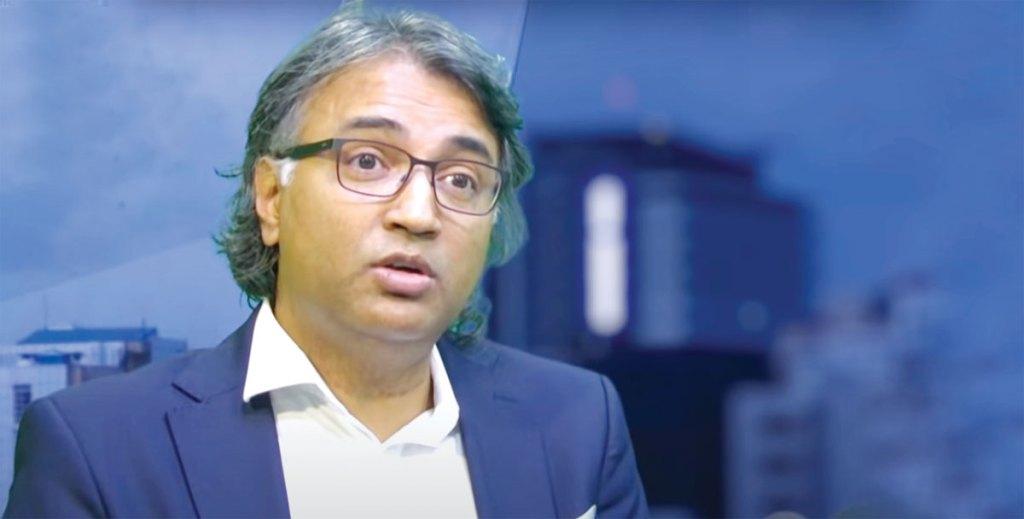Africa-Press – Mauritius. When you examine the record of the government of Pravind Jugnauth after these three years in power, what analysis do you make of its achievements, its shortcomings and its future prospects on the political level?
Rabin Bhujun: This is a big topic that requires a long answer. To put it simply, consider an assessment on four dimensions: Economic, Infrastructural, Institutional and Social.
The economy is well and truly on the mend after the Covid crisis. In the latest edition of MCB Focus, the 2022 growth rate estimate has been revised slightly upwards to 6.2%.
But the forecast for next year has been lowered to 5%. Tourism is having a good end to the year, export industries have rebounded well, while the financial services sector has demonstrated its resilience year after year.
However, the war in Ukraine, the economic slowdown in our main markets, the glaring lack of labor in several of our industries, imported inflation, among other things, do not allow us to think that we will be able to continue for very long. on the trajectory of 5% growth.
In terms of infrastructure, year 3 of this government’s previous mandate was already marked by fairly significant progress in the Metro Express project and the end of repairs on the Terre-Rouge/Verdun highway, a true nerve center of the country.
The entry into operation of the first phase of the project on the eve of the 2019 legislative elections was the high point of the infrastructure program of the last term.
There are indeed a few large-scale projects that have been and will be inaugurated in the months and year to come. But none have the same “wow factor” and the immediate effect on the mobility of thousands of Mauritians.
Worse, the entry into operation of the Metro Express causes a daily nightmare for thousands of Mauritians in Quatre-Bornes or Vacoas. On the institutional level, the results are as catastrophic as they are shameful.
This government installed its partisans and its underlings in all the institutions of the country. It is difficult to discern, in this crowd of mediocre people, the “right (wo)men in the right place”.
From Air Mauritius to the most strategic parastatal bodies, it is the culture of “wi misié” that has taken hold and prevails. However, the most serious and worrying thing, in my opinion, is that this government has more or less succeeded in splitting this country in two.
Between, on the one hand, those who cultivate a permanent and pathological distrust of the government – and worse – the state itself; and on the other hand, those who go about their daily routine without being the least interested or offended by what inflames the columns of our newspapers and the lives of our radio stations.
Let’s be realistic, however, the wrongs are also shared. This polarization is instigated by political forces – not just in government – who cynically believe they are gaining political and electoral capital from it.
* While there have been advances, mainly on the infrastructure front, the same cannot be said on the issue of good governance, or even the government’s attitude towards its political adversaries – parliamentary or non-parliamentary.
Basically, there does not seem to be any fundamental difference between the method of Anerood Jugnauth and that of his son, right? There is indeed a fundamental difference between Sir Anerood Jugnauth and his son.
SAJ knew how to delegate. For this, you must have a certain confidence in your collaborators – whether they are ministers or political nominees. Although SAJ obviously made partisan choices in most cases, he was also known for not relying solely on partisan criteria.
Pravind Jugnauth installs mediocre people in all kinds of positions of responsibility on the sole basis of their loyalty and their profile. SAJ was “enn tipe pli tipti ki bondie” for some of his admirers.
Pravind Jugnauth is him – downright – the all-powerful for those who owe him their political existence. There is worse. SAJ maintained a healthy relationship with its employees.
He welcomed and listened to differing opinions, even though he was the final decision maker. Pravind Jugnauth is a sphinx, who listens without letting anything show through what he thinks. His ministers dare not tell him his four truths. Their many frustrations are only really expressed in small groups.
The more daring are even thinking of schemes to send messages back through the powerful and influential Kitchen Cabinet of Pravind Jugnauth, in the hope of getting the Prime Minister to act on certain sensitive issues.
For example, several orange ministers ardently wish that Yogida Sawmynaden be expelled from the party, in order to send a strong signal. But Jugnauth and his ‘Kitchen’ do not let go, for some obscure reason.
* To return to the methods employed under the tutelage of the current government, one need only refer to the recent attacks by the ‘Special Striking Team’ of the police force – the search followed by the arrest of Akil Bissessur and of his partner, the raid and search of Sanjeev Teeluckdharry’s parents-in-law and those of Bruneau Laurette – all appearing on an alleged ‘hitlist’ of the regime.
. Nothing has been proven so far because the investigations are still “on ” in some cases. But all this cannot be reduced to impulsive acts. What do you think ?
It would also be necessary to create a list of all the credulous people who believe anything and everything by reading the many nonsense published daily on social networks.
It is still appalling that some press titles have chosen to report the existence of the laughable “hit list” without taking any kind of step back. Any rational, self-respecting journalist would see the deception in two seconds and not report it at all.
Or he would do so in order to make it clear that it is – at best – a hoax or – at worst – a concerted attempt to manipulate public opinion with the complicity of complacent or partisan media.
To come back to your question, there is a well-established “political narrative” around the arrest of Laurette and Bissessur. So I think that we absolutely have to distance ourselves from what one or the other wants us to believe.
I’m waiting to see how the two investigations end up before deciding. Meanwhile, I just note that the tone and the words of Laurette’s lawyers have changed considerably between the time he was apprehended and this beginning of the week.
I even heard them praise the professionalism of the investigators. What did they realise? What have we explained to them? What have they been shown to suddenly be far less belligerent? I don’t have the answer to these questions. On the other hand, I think that the search at the in-laws of Sanjeev Teeluckdharry is shocking.
This episode gives us the impression that a search warrant with a fairly broad framework has been drawn up so that the police can carry out a “fishing expedition” the day before the demonstration organized by Laurette and her sympathizers.
It is an episode that appears as a maneuver of harassment, retaliation and pressure: it is a very bad signal. For the time being, I have no a priori – neither positive nor negative – on the work of the Police Head Quarters Special Striking Team of ASP Jagai.
He is in the heat of the news and he takes care of many “very high profile cases”. All I wish for him is that he doesn’t contract the same habits and syndrome as another once very well-known and controversial ASP, Prem Raddhoa.
* Despite all the shocks and other scandals that hit it, the government of Pravind Jugnauth manages to stay the course.
There is also the usury of power or the demonstrations in the streets or those in court. What explanation can be given for all this? If Pravind Jugnauth is doing so well, it is because the opposition is failing miserably.
Bruneau Laurette’s latest demonstration has once again demonstrated that the PTr, the MMM and the PMSD still do not agree on the fundamentals: the great gathering of all the forces of the opposition.
Xavier Duval gives a rant following the very visible support of the reds to Bruneau Laurette; two days later the PTr/PMSD/MMM trio announced an alliance for municipal elections.
. while Laurette said she wanted to siphon off the blue and purple electorate. The opposition constantly blows hot and cold on its ability to represent a coherent, credible and therefore winning alternative to the government.
This is why we hear more rumors of deputies preparing to leave the ranks of the opposition parties than the reverse. The opposition, unlike the 2003-2005 dynamic in favor of the Labor Party, does not really appear to be a real and imminent threat to the government.
* Moreover, even if there is very strong anti-government sentiment on social networks and in certain press titles, it is difficult to fully grasp the real ‘mood’ of the electorate vis-à-vis the government.
Is it possible that a significant number of voters – often silent – have a different opinion from Internet users? Social networks are absolutely not a reflection of the reality of the mood of the whole country.
Their algorithms are designed to serve you ‘more of the same’, i. e. fans of Pravind Jugnauth will most often see content glorifying him while opposition supporters will mostly see ‘ posts’ criticism of the government.
Moreover, it is those who have chosen their side who most often express themselves on the networks. So, even online and in the comment columns of the articles of the major press groups, there is a silent majority, who watches and reads without commenting and whose opinion we do not know.
This should come as no surprise. Remember, the Straconsult / Le Mauricien poll of May 2022 concluding that 56% of Mauritians do not opt for any party
I therefore cannot answer your question by saying that a silent majority does not share the feeling that you consider to be predominant on social networks. I can, on the other hand, only conclude that since this majority exists and it is silent, one cannot speculate on what it thinks.
It is possible that the next legislative elections will be an almost identical repetition of 2019 or that we will find ourselves in a late and real dynamic leading to the same type of consequences as in December 2014.
For More News And Analysis About Mauritius Follow Africa-Press







